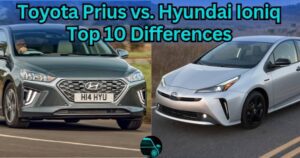In the world of compact sedans, the debate between the Toyota Corolla vs. Nissan Sentra is a hot topic for car enthusiasts and everyday drivers alike. Both vehicles boast a long-standing reputation for reliability, fuel efficiency, and overall value, making them top contenders for anyone in the market for a dependable ride. Yet, despite their similarities, there are key differences that set them apart. From performance nuances and interior comforts to technological advancements and safety features, the Toyota Corolla and Nissan Sentra each offer unique appeals to potential buyers.
In this article, we dive deep into the top 10 differences between these two iconic models, helping you decide which sedan best matches your driving needs and lifestyle. Whether you’re a long-time fan or a curious newcomer, understanding the Toyota Corolla vs. Nissan Sentra matchup is essential for making an informed decision.
10 Differences: Toyota Corolla vs. Nissan Sentra
1. Exterior Design
When evaluating the Toyota Corolla vs. Nissan Sentra, the exterior design of each vehicle showcases distinct philosophies from their respective brands, highlighting an essential difference that sways potential buyers. The Toyota Corolla features a more aggressive and sporty design, with sharp lines and a dynamic stance that appeals to those seeking a youthful and energetic appearance. On the other hand, the Nissan Sentra opts for a more elegant and refined look, with smooth curves and a sophisticated profile that exudes a sense of maturity and luxury.
| Feature | Toyota Corolla | Nissan Sentra |
| Design Philosophy | Aggressive and sporty | Elegant and sophisticated |
| Front Fascia | Bold grille with sharp headlights | V-motion grille with sleek headlights |
| Profile | Dynamic stance with angular lines | Smooth lines with a refined profile |
| Appeal | Youthful and energetic | Mature and luxurious |
Both cars offer distinctive exterior designs that reflect the brands’ visions, making the Toyota Corolla vs. Nissan Sentra comparison a matter of personal taste in aesthetics. Whether you’re drawn to the sporty vivacity of the Corolla or the understated elegance of the Sentra, both vehicles make strong statements on the road.
2. Interior Comfort
Delving into the interior comfort of the Toyota Corolla vs. Nissan Sentra reveals insights into each brand’s approach to the driver and passenger experience. The Toyota Corolla focuses on a functional and intuitive interior layout, emphasizing ergonomics and user-friendly controls. Its seats are designed for support during longer drives, with higher trims offering more luxurious materials. The Nissan Sentra, conversely, leans towards a more plush and premium-feeling interior, with an emphasis on soft-touch materials and comfort features such as optional heated seats and dual-zone climate control, even on lower trims.
| Feature | Toyota Corolla | Nissan Sentra |
| Seat Comfort | Supportive seats designed for long drives | Plush seating with available heating |
| Material Quality | Durable and functional with luxury options in higher trims | Premium soft-touch materials throughout |
| Climate Control | Standard automatic climate control is standard in most trims | Optional dual-zone climate control for precise comfort |
| Layout & Ergonomics | User-friendly and intuitive | Focus on luxury and convenience |
In the Toyota Corolla vs. Nissan Sentra matchup, the choice between interior comfort comes down to preference: the straightforward, ergonomic design of the Corolla or the Sentra’s emphasis on luxury and comfort enhancements.
3. Infotainment System
In the realm of technology, the infotainment systems of the Toyota Corolla vs. Nissan Sentra showcase each brand’s priorities in connectivity and entertainment. The Toyota Corolla comes equipped with an intuitive infotainment system, featuring Apple CarPlay, Android Auto, and Amazon Alexa compatibility as standard across all trims. Its touchscreen display is crisp and responsive, providing drivers with easy access to navigation, media, and vehicle settings. The Nissan Sentra doesn’t lag, offering a similarly user-friendly interface with the added benefit of a slightly larger standard touchscreen display. Nissan also includes Apple CarPlay and Android Auto as standard features, ensuring drivers remain connected on the go.
| Feature | Toyota Corolla | Nissan Sentra |
| Standard Screen Size | 7-inch touchscreen | 8-inch touchscreen |
| Connectivity | Apple CarPlay, Android Auto, and Amazon Alexa | Apple CarPlay, Android Auto |
| Navigation | Available in higher trims | Available with NissanConnect services |
| Audio System | 6-speaker system standard, JBL upgrade | Bose premium audio is available as an upgrade |
When comparing the Toyota Corolla vs. Nissan Sentra in terms of entertainment, both vehicles offer robust systems designed to keep drivers connected and entertained. The choice may come down to personal preference for interface design or specific audio system brands.
4. Fuel Efficiency
When delving into fuel efficiency, a critical aspect for many buyers, the Toyota Corolla vs. Nissan Sentra comparison reveals both sedans as strong contenders in the economy segment. The Toyota Corolla, known for its long-standing reputation for fuel efficiency, offers impressive miles per gallon (mpg) across its range, including its hybrid variant, which is a standout for those looking to maximize their fuel economy. On the other hand, the Nissan Sentra, while not offering a hybrid model, provides commendable fuel efficiency that competes closely with non-hybrid versions of the Corolla, thanks to its efficient engine tuning and continuously variable transmission (CVT).
| Feature | Toyota Corolla | Nissan Sentra |
| Standard Engine | Up to 31 mpg city / 40 mpg highway | Up to 29 mpg city / 39 mpg highway |
| Hybrid Model | Up to 53 mpg city / 52 mpg highway (Hybrid) | Not available |
In the Toyota Corolla vs. Nissan Sentra battle for fuel efficiency, both cars offer economical options for budget-conscious drivers. The Corolla takes a slight lead, especially with its hybrid option, providing unparalleled efficiency for those prioritizing fuel savings.
5. Performance
In the performance arena of the Toyota Corolla vs. Nissan Sentra comparison, both vehicles offer unique driving experiences that cater to different driver preferences. The Toyota Corolla, with its array of engine options, including a more performance-oriented 2.0-liter Dynamic Force engine, delivers a blend of efficiency and zest, particularly in its hatchback and GR models. The Nissan Sentra, on the other hand, focuses on providing a comfortable ride with its standard powertrain, ensuring a smooth and stable drive, albeit with a single engine choice that prioritizes efficiency over exhilaration.
| Feature | Toyota Corolla | Nissan Sentra |
| Engine Options | 1.8L I4, 2.0L Dynamic Force, 1.8L hybrid | 2.0L I4 |
| Horsepower | Up to 169 hp (2.0L) | 149 hp |
| Driving Dynamics | Sportier in GR and hatchback models | Tuned for comfort, less emphasis on sportiness |
Through the lens of performance in the Toyota Corolla vs. Nissan Sentra showdown, the Corolla edges out with a more diverse engine lineup and a nod towards drivers seeking a sportier feel, particularly in its specialized models, while the Sentra caters to those looking for a reliably smooth and steady ride.
6. Safety Features
When comparing the safety features of the Toyota Corolla vs. Nissan Sentra, both cars come equipped with a robust suite of safety technologies aimed at protecting passengers and enhancing driver awareness. The Toyota Corolla shines with its Toyota Safety Sense 2.0 (TSS 2.0), offering advanced features such as a pre-collision system with pedestrian detection, lane departure alert with steering assist, and adaptive cruise control as standard. Meanwhile, the Nissan Sentra counters with Nissan’s Safety Shield 360, which includes automatic emergency braking with pedestrian detection, rear cross-traffic alert, and blind-spot warning among its key features, ensuring comprehensive safety coverage.
| Safety Feature | Toyota Corolla | Nissan Sentra |
| Standard Safety Suite | Toyota Safety Sense 2.0 (TSS 2.0) | Nissan Safety Shield 360 |
| Pre-Collision System | Yes, with pedestrian detection | Yes, with pedestrian detection |
| Lane Departure Alert | Yes, with steering assistance | Yes, with intelligent lane intervention |
| Adaptive Cruise Control | Standard | Available |
| Blind-Spot Warning | Available | Standard |
In the realm of safety within the Toyota Corolla vs. Nissan Sentra debate, both vehicles demonstrate a strong commitment to driver and passenger safety. The choice between them may come down to personal preference for specific safety technologies or the overall safety package offered as standard.
7. Reliability
In the ongoing debate about the Toyota Corolla vs. Nissan Sentra, reliability is a pivotal factor for many buyers. Both models have historically offered commendable dependability, but the Toyota Corolla often edges out with a slightly better track record, as reflected in various consumer reliability ratings and long-term owner feedback. Toyota’s reputation for building durable vehicles that stand the test of time shines through in the Corolla, making it a favorite among those seeking a worry-free ownership experience.
The Nissan Sentra has made significant strides in improving its reliability, offering robust engine options and a comfortable ride that rivals its competitors. However, when comparing the Toyota Corolla vs. Nissan Sentra directly, the Corolla’s long-standing legacy of reliability and higher resale value gives it an edge over those prioritizing long-term dependability.
| Aspect | Toyota Corolla | Nissan Sentra |
| Reliability | Higher in long-term reliability ratings | Improving, but slightly behind Corolla |
| Resale Value | Generally higher | Slightly lower |
| Legacy | Decades-long reputation for dependability | Building a stronger reliability reputation |
While both the Toyota Corolla and Nissan Sentra are reliable choices in the compact car segment, the Corolla’s proven track record may sway buyers looking for established dependability.
8. Price
When comparing the Toyota Corolla vs. Nissan Sentra, price is often a decisive factor for many buyers. The Nissan Sentra typically offers a more attractive starting price, appealing to budget-conscious consumers seeking value without compromising on essential features. The Toyota Corolla, while slightly higher in its base price, justifies the investment with its robust resale value, superior reliability, and a comprehensive suite of standard safety features.
The initial cost difference becomes a consideration of long-term value. Buyers leaning toward the Sentra appreciate its affordability and the features offered at lower trim levels. Conversely, those opting for the Corolla recognize the enduring value of Toyota’s reputation, which often translates into less depreciation over time.
| Aspect | Toyota Corolla | Nissan Sentra |
| Starting Price | ~$20,425 | ~$19,410 |
| Resale Value | Higher | Lower |
| Standard Features | Comprehensive safety suite | Competitive, value-focused features |
In the Toyota Corolla vs. Nissan Sentra debate, your preference might hinge on upfront cost versus long-term value, making both cars compelling choices depending on individual priorities.
9. Interior Features
In the Toyota Corolla vs. Nissan Sentra showdown, interior features play a pivotal role in swaying potential buyers. The Toyota Corolla prides itself on its upscale interior, offering a blend of comfort and technology that feels premium at its price point. With soft-touch materials and an ergonomic design, the Corolla aims to enhance the driving experience. The Nissan Sentra doesn’t lag far behind, providing a surprisingly spacious and well-appointed cabin that emphasizes comfort and user-friendliness, with an intuitive layout that drivers appreciate.
Both vehicles come equipped with modern infotainment systems, but the Corolla edges ahead with its standard inclusion of advanced safety features and connectivity options. The Sentra counters with competitive technology offerings and spaciousness that rival more expensive sedans.
| Feature | Toyota Corolla | Nissan Sentra |
| Materials | Soft-touch, higher-quality materials | Durable, comfortable materials |
| Infotainment System | Advanced, with standard safety and connectivity | User-friendly, with ample tech features |
| Interior Space | Ergonomically designed, comfortable for its class | Spacious interior, best-in-class rear legroom |
| Safety Features | Comprehensive standard safety suite | Robust safety features, slightly less comprehensive |
In the Toyota Corolla vs. Nissan Sentra comparison, discerning buyers will find distinct advantages in interior features depending on their preferences for material quality, technology, and space.
10. Overall Value
In the debate between the Toyota Corolla vs. Nissan Sentra, discerning the overall value is key to making an informed decision. Both vehicles offer compelling arguments, but their value proposition hinges on what consumers prioritize: reliability, features, or cost.
The Toyota Corolla is renowned for its reliability and resale value, aspects that are highly valued by long-term owners. It’s a vehicle that promises dependability and consistent performance. The Nissan Sentra, on the other hand, stands out for its affordability and generous standard features at a lower price point, appealing to those seeking immediate value and comfort without a hefty price tag.
| Aspect | Toyota Corolla | Nissan Sentra |
| Reliability | Exceptional, with a longstanding reputation | Good, but generally perceived as slightly behind Toyota |
| Standard Features | Comprehensive safety technology; basic infotainment in base models | Rich in features even at lower trims, including advanced infotainment options |
| Price | Higher initial cost but less depreciation | Lower starting price, offering immediate savings |
| Resale Value | Higher, thanks to brand reputation and reliability | Lower, but initial savings may offset this |
When weighing the Toyota Corolla vs. Nissan Sentra for overall value, your choice will reflect personal priorities: the long-term dependability and resale value of the Corolla or the immediate affordability and feature-rich nature of the Sentra. Both cars offer solid value in their rights, catering to different segments of the automotive market.
Conclusion
In conclusion, both the Toyota Corolla and the Nissan Sentra are solid choices for compact sedan buyers, each offering its own set of features, advantages, and drawbacks. If you’re seeking deeper insights into this topic, you might consider consulting a ghostwriter matheklausur, a helpful assistant in academic and detailed examinations. Whether you prioritize reliability, fuel efficiency, or driving dynamics, there’s a compact sedan out there to suit your needs and preferences. Ultimately, the choice between the Corolla and the Sentra comes down to personal preference and what matters most to you as a driver.
FAQ
1. What are the key performance differences in the Toyota Corolla vs. Nissan Sentra comparison?
The Toyota Corolla often features a slightly more refined engine lineup, offering a blend of efficiency and power that appeals to a broad audience. The Nissan Sentra, while also focusing on fuel efficiency, sometimes lags in terms of raw power and driving dynamics.
2. How do the interiors of the Toyota Corolla and Nissan Sentra compare?
Both models boast comfortable and well-designed interiors, but the Corolla typically edges out with higher-quality materials and a more modern design ethos. The Sentra is praised for its spaciousness and user-friendly technology.
3. Which is more technologically advanced, the Corolla or the Sentra?
Both vehicles offer a competitive suite of tech features, including advanced infotainment systems and driver assistance technologies. However, the Toyota Corolla might have a slight advantage with its newer models incorporating more up-to-date and standard tech features across all trims.
4. In terms of safety, how do the Toyota Corolla and Nissan Sentra stack up?
Both the Corolla and Sentra are highly rated for safety, coming equipped with comprehensive active and passive safety features. The Toyota Corolla has consistently earned high marks from safety regulators, slightly outperforming the Sentra in some assessments.
5. Considering fuel economy, which car is more efficient—the Toyota Corolla or the Nissan Sentra?
Fuel efficiency is a strong suit for both models, with each offering eco-friendly variants that maximize miles per gallon. The Toyota Corolla’s hybrid option typically offers superior fuel efficiency, making it the go-to for those prioritizing eco-conscious driving.




